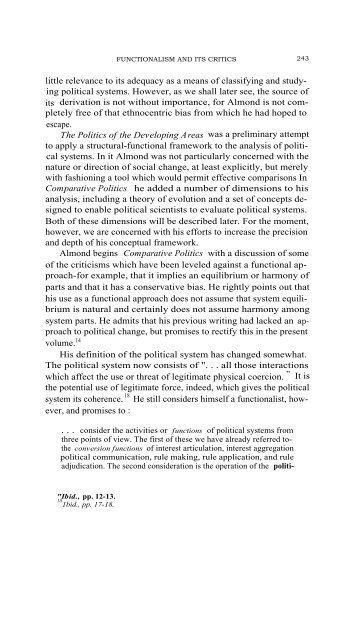FUNCTIONALISM AND ITS CRITICS - Intercollegiate Studies Institute
FUNCTIONALISM AND ITS CRITICS - Intercollegiate Studies Institute
FUNCTIONALISM AND ITS CRITICS - Intercollegiate Studies Institute
Create successful ePaper yourself
Turn your PDF publications into a flip-book with our unique Google optimized e-Paper software.
<strong>FUNCTIONALISM</strong> <strong>AND</strong> <strong>ITS</strong> <strong>CRITICS</strong><br />
little relevance to its adequacy as a means of classifying and studying<br />
political systems. However, as we shall later see, the source of<br />
its derivation is not without importance, for Almond is not completely<br />
free of that ethnocentric bias from which he had hoped to<br />
escape.<br />
The Politics of the Developing Areas was a preliminary attempt<br />
to apply a structural-functional framework to the analysis of political<br />
systems. In it Almond was not particularly concerned with the<br />
nature or direction of social change, at least explicitly, but merely<br />
with fashioning a tool which would permit effective comparisons In<br />
Comparative Politics he added a number of dimensions to his<br />
analysis, including a theory of evolution and a set of concepts designed<br />
to enable political scientists to evaluate political systems.<br />
Both of these dimensions will be described later. For the moment,<br />
however, we are concerned with his efforts to increase the precision<br />
and depth of his conceptual framework.<br />
Almond begins Comparative Politics with a discussion of some<br />
of the criticisms which have been leveled against a functional approach-for<br />
example, that it implies an equilibrium or harmony of<br />
parts and that it has a conservative bias. He rightly points out that<br />
his use as a functional approach does not assume that system equilibrium<br />
is natural and certainly does not assume harmony among<br />
system parts. He admits that his previous writing had lacked an approach<br />
to political change, but promises to rectify this in the present<br />
volume. 14<br />
His definition of the political system has changed somewhat.<br />
The political system now consists of ". . . all those interactions<br />
which affect the use or threat of legitimate physical coercion. " It is<br />
the potential use of legitimate force, indeed, which gives the political<br />
system its coherence. 18 He still considers himself a functionalist, however,<br />
and promises to :<br />
. . . consider the activities or functions of political systems from<br />
three points of view. The first of these we have already referred tothe<br />
conversion functions of interest articulation, interest aggregation<br />
political communication, rule making, rule application, and rule<br />
adjudication. The second consideration is the operation of the politi-<br />
"Ibid., pp. 12-13.<br />
18 1bid., pp. 17-18.<br />
243
















